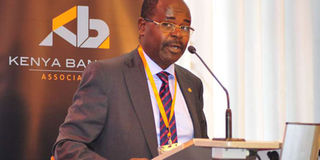Repealing interest cap law no magic bullet

Kenya Bankers Association chief executive officer Habil Olaka speaks during the 6th Annual Banking Research Conference at Radisson Blu Hotel, Nairobi, on September 28, 2017. The association wants the law capping interest rates repealed. PHOTO | SALATON NJAU | NATION MEDIA GROUP
What you need to know:
- It is also common knowledge that Kenya’s economy tends to depreciate around election time.
- With increased pressure of debt repayment, domestic borrowing has become the preferred tool to bridge the budget deficit.
Since interest rate caps were introduced on August 2016, banks have been lobbying for their repeal, arguing that low loan interest rates have reduced access to credit for the private sector, slowing the economy.
But while this argument appears credible, there are other underlying factors that affect the economy and need to be taken into consideration.
A fundamental weakness of economic theory is the assumption of ceteris paribus — which simply means “other factors held constant”.
An economic model that attempts to predict the relationship between one economic variable and all others is practically impossible to implement.
Therefore, economists usually isolate the relationship between variables on the assumption that all the other factors are constant.
In the real world though, ceteris paribus does not exist.
ELECTIONS
Notably, economists are never in full control of the economy — else, countries with brilliant economists, including advanced economies, would never experience slumps or turmoil.
The economic cycle of ups and downs is caused by a multitude of factors and economists are in a constant balancing act, adjusting them.
There is never a state of perfect and permanent equilibrium. Kenyan’s economy was slowing before August 2016. The official economic reports notwithstanding, from as early as 2015, when the wave of massive job retrenchments hit our shores, the worrying signs were evident.
This was way before the interest rate controls and it continues to date.
It is also common knowledge that Kenya’s economy tends to depreciate around election time.
The protracted 2017 presidential election has not done the economy any favour and to ignore its effect on the economy is to play foolhardy.
DOMESTIC BORROWING
Government borrowing is the other elephant in the room. As debts mature, the outflow of precious dollars hits the economy hard.
Of course with increased pressure of debt repayment, domestic borrowing has become the preferred tool to bridge the budget deficit.
Since the interest rate capping, commercial banks have found it more attractive to lend to the government than to private entities.
Government debt is considered low-risk and banks, therefore, argue that they lock out the private sector since loan interest rates to the latter are significantly higher than Treasury bills earnings.
PRIVATE SECTOR
The banks argue that the caps should be removed to allow them to raise interest rates on loans to private entities and increase lending to the private sector.
What they are not telling us is that the government needs to cutback on domestic borrowing.
Assuming that it did, will banks keep their money under the mattress or find the seven per cent margin sufficient for lending to the private sector?
And how will Kenya fund its infrastructure programmes?
Kenya can no longer afford to borrow more from anywhere — domestic or foreign. The country is like a man who owes so much to his neighbours that he can no longer call on them.
TAX EVASION
He resorts to borrowing from his wife (domestic commercial banks) at the expense of the needs of the children (the productive private sector).
It is time to restructure the national budget as its continuous rapid ballooning does not necessarily translate to faster economic growth and recurrent expenditure does not add to improving our capacity.
The other reality is tax evasion. If the Kenya Revenue Authority could bring more people into the net, domestic borrowing would reduce a lot.
There is more to Kenya’s economic problem than interest rate controls but let the government cutback on domestic borrowing to stop the crowding out of private entities from bank financing.
Mr Chando is senior internal auditor, Nation Media Group. [email protected].





